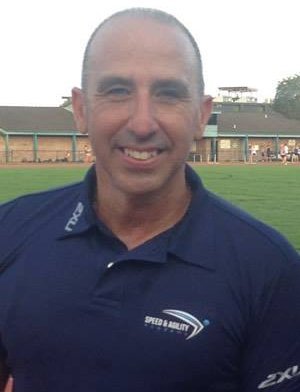In today’s interview, we chat to Roger Fabri, one of Australia’s top sprint coaches and the founder of Speed Agility Academy. After a hugely successful career as an elite runner, Roger Fabri turned his hand to coaching in 1995 and has been inspiring young athletes across Australia ever since
Roger, tell us your sporting story
As an athlete I was always a handy sprinter, even in school. I progressed all the way through but never reached any national height. I had an intense passion for track but was also keen on soccer and basketball.
I’m an extremely passionate person and I pride myself on my knowledge as far as speed is concerned. While competing as an athlete, I educated myself as much as possible by going abroad and listening to speakers whenever I could.
In my coaching career, I had an opportunity to work with Anthony Minichiello, a high level NRL player. He had chronic back injuries and asked me to look at his technique to try and get him back on the field. I did and succeeded. With that little bit of exposure and media attention, I was able to draw in more people to my coaching business.
At first, I coached part-time whilst also working very hard in a corporate job but now I coach full time and have a team of 16 coaches.
What sporting or coaching achievements are you most proud of and why?
I don’t have one particular achievement I’m very proud of. However, in my career there’s been a magnitude of highlights. Watching athletes represent Australia makes me very proud. One of my greatest achievements was when Jarryd Hayne made it in the NFL.
The growth of my business and giving the athletes I coach an opportunity to have a career in sports is incredibly satisfying. I like being able to give something back to them.
What have been your career lows?
I suffer with extreme anxiety. The most significant point in my life was when I was around 29. My parents lost all their money and we went from the penthouse to the shit house. We didn’t have anything and had to start all over again. I had a severe mental breakdown.
It took me around 18 months to get myself back on track and medication-free. I was very committed to the cause. I removed all stimulants out of my life, even caffeine and chocolate. I meditated a lot, tried to eat well and exercised plenty.
Two years ago, my father whom I was very close to, passed away. This had a significant effect on me and nearly got me to the point where I lost everything I’d worked hard for.
I couldn’t take any time off to grieve as I didn’t have much money saved up or other sources of income. So, I painted a brave face and kept the show rolling, despite crumbling inside. I was very troubled during this time and experienced many dark thoughts.
I actually had more dark thoughts than I had normal thoughts. I could never think clearly.
I’m now on antidepressants, and I’ll be honest with you, it’s been the biggest blessing in disguise. I’ve probably suffered with depression and anxiety all my life but it wasn’t until this point that I realised it. The medication helped lift the constant cloud that hovered over me.
I used to think that life was overrated. I never enjoyed anything and was simply plodding along. But now, with the support of the medication and the changes I’ve made to my lifestyle, I actually enjoy life! I still get bad days but they’re not as bad as they used to be.
As an athlete you need to be physically and mentally fit. Have there been times in your career when you’ve had to call on your mental strength?
All the time. On those tough days, when things got hard, I used to get in the car and want to drive on the other side of the road. It was terrible. I just wanted that “feeling” to end as I couldn’t handle it anymore. I didn’t want to wake up in the morning as the whole cycle would start again.
What kept you going?
There was a voice in my head saying “it’ll pass, just hang in there”. It wasn’t just about me; I had my daughter and wife to think about. I also had other people depending on me like the athletes I coach and mentor. I kept saying to myself “It’s just a tunnel; there is light”. The only thing is, I didn’t know how long the tunnel was!
Do you believe that if someone can speak freely about their mental health issues, they’ll be able to perform better?
I certainly think it would help but I don’t think it’s the only factor. It’s always better to talk about your mental health, rather than bottling it up and pretending you’re okay because you’re scared of getting benched.
How do you manage pressure?
It’s part and parcel of the game. The one theory I constantly go back to and keep telling myself is, I can only worry about things I can control. If I can’t control something, I try my darnedest to focus my attention on things that I can control.
You can’t always succeed and unfortunately, the first person who gets blamed in any type of sport is the coach. The coaching staff are usually the first people that get moved on. There’s nothing you can do about it. If you’ve done everything in your power to help your athletes succeed, then you’ve just got to believe in your processes and understand that you win some, you lose some.
Self-talk is a big part of sport and mental health. Do you practice self-talk?
I never used to; however, a big part of my recovery has involved positive self-talk. One thing I’m fortunate about is the rules I learned in counselling. It’s easy for me to change my way of thinking because I preach these rules to my athletes.
Do you have any rituals before a race or coaching session?
Before coaching, I have an affirmation I always say to myself. I want to be the best in this industry, so this helps reaffirm it. I try to coach differently to anybody else. I’m not a facilitator, I’m an educator. I’m there to train, not to entertain. And no matter how bad I feel, the session will go for 45 minutes. I’ve got to make sure I bring the A game every single session.
How important were these rituals?
Having rituals helps me perform better. How I’m perceived is very important to me. I’m insecure at the best of times, so I work hard to be the best at this game.
Do you take time to self-care? What do you do?
On my bad days I do, but on my good days, I just sort of go with the flow as I want to enjoy life. Exercise is my number one go-to for self-care. It calms me right down. It must be high-intensity sprints where I’m in and out of my high heart rate. I get peace in doing this and that’s priceless.
What advice can you offer other sports professionals to help keep their head in the game?
Never ever give up because the sun will always shine someday, somehow, and you’ll find what works for you. Persist because life can be good, you’ve just got to persevere at it. And if it’s medication that’s going to get you to smile, so what? Go for it, don’t suffer alone. Get the help you need as that’s what it’s there for. I’ve done it and I’m living proof it can work.
Do you, your organisation or sporting team need help promoting good mental health? Read more about our Mental Health in Sport Workshop details here.
Enjoy this interview?
Join our mailing list to get notified when we post more interviews.



